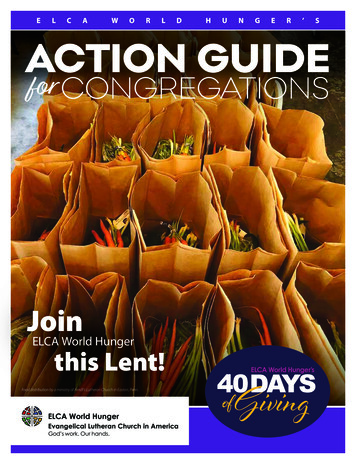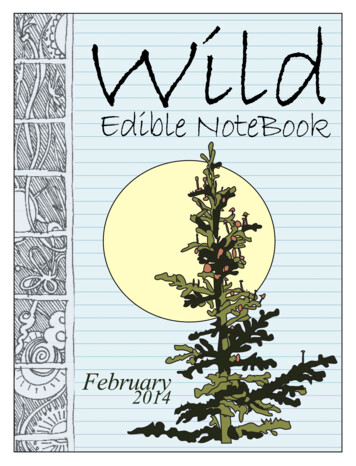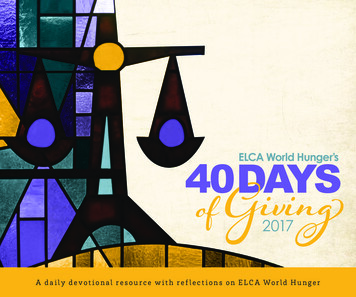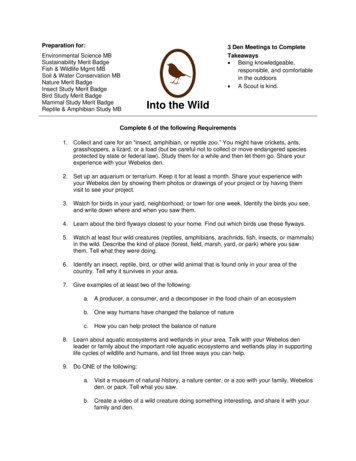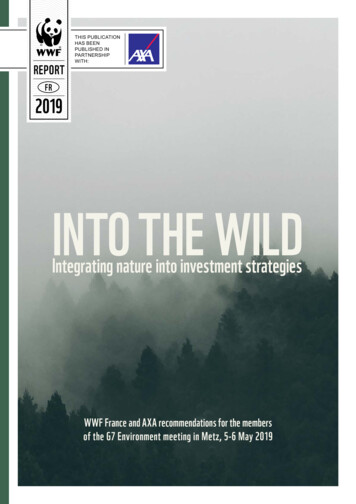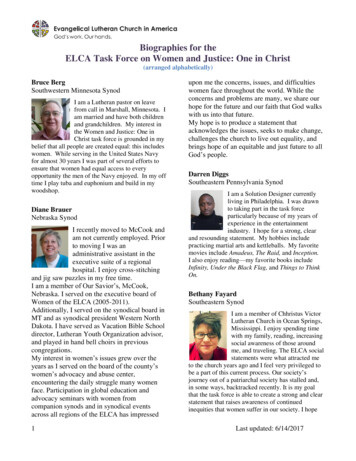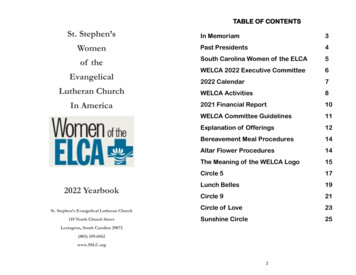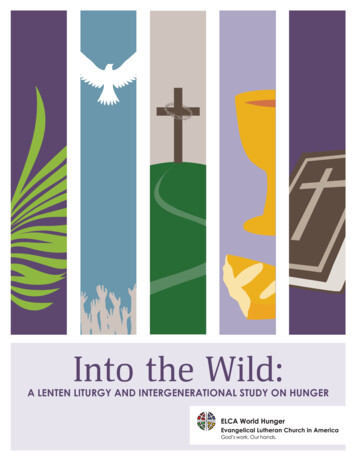
Transcription
Into the Wild:A LENTEN LITURGY AND INTERGENERATIONAL STUDY ON HUNGER
Dear Leader,Welcome to “Into the Wild: a Lenten Liturgy and Intergenerational Study on Hunger.” As you know, the 40days of Lent are a time of solemn reflection. During this season, we reflect on our communion with Godand our alienation from God. We focus our awareness on the loneliness of Christ in Gethsemane, his deathon the cross, and our dependence on God’s infinite mercy, while resting in the hope of the Easter to come.The Scriptures for this season are abundant in images of the wilderness: Jesus’ temptation, Moses’ time onMount Sinai and the wandering of the Hebrews after the Exodus. It is a time of confession, repentance and,for many, fasting.For nearly 1 billion people in the world, going hungry is not a spiritual practice or reverent sacrifice. Hungeris a reality in which many of our brothers and sisters live every day. This Lent, ELCA World Hunger invitesyou and your congregation to go “Into the Wild,” to follow Jesus into the wilderness and to reflect on yourown journey into the “wild places” of the world where we encounter human need, abuse of power, risk andGod’s grace. Many suffer in the wilderness of the world, yet we know that the Holy Spirit is there, callingus, accompanying us and empowering us to meet our own needs by serving the needs of our neighbors. Weknow that the call to share in God’s good news is a call made to all Christians, of every age, in baptism.This Lenten series consists of five liturgies and lessons, each building on themes found in Luke 4:1-21.During the course of the series, your congregation will reflect on baptism, hunger, power, faith and the goodnews Jesus proclaims to the poor, the oppressed and the captive (Luke 4:18). A key feature of this seriesis its accessibility for all generations. We encourage you to invite children, youth, young adults and olderadults to join in each week. There are opportunities for all ages to participate and to lead.Throughout “Into the Wild,” you will see times set aside for both small and large groups to encourage richconversations among participants. There are handouts for some of the lessons, as well as opportunities toview videos from the ELCA World Hunger video series. Each lesson is written as a script with particularquestions for discussion and, when combined with the liturgy for the lesson, should take about one hour.Please feel free to adapt each lesson to best serve your congregation’s needs.In each lesson, you will find: an opening liturgy with readings, an overview and leader’s script for the lesson,a series of reflection questions to end the lesson and a brief closing liturgy. There is also a discussion guidecalled “40 Days of Wonderings” which goes along with this program and is an opportunity for families tocontinue the conversation at home. Please pass this along to parents and families, even if they are unable toparticipate in the program.We journey together “into the wild” of Lent, to a place where we encounter the living God in the midst ofhunger and poverty. If you would like to continue learning about hunger and the ELCA’s response, pleasevisit www.ELCA.org/hunger for more resources.Sincerely,Ryan CummingDirector of ELCA World Hunger Education
LESSON #1Leader’s Guide“Jesus was led by the Spirit into the wilderness ”PREPARATION AND SUMMARY OF LESSONThis lesson can best be led by someone familiar with theLutheran understanding of the sacrament of Baptism, justin case there are questions about baptism from the group.Unbaptized individuals should be made welcome, thoughthe leader should be careful to note that the ritual at theend of this lesson does not constitute Baptism for someonewho has not yet received the sacrament themselves.MATERIALSNEEDEDLarge piecesof paper on along table (if youcan use one rollof paper, thatwould be great!Be sure to savethis for Lesson #5)Markers ofdifferent colorsBaptismal font orclear glass bowlof water on tableArrange the paper on a long table so that all participantscan draw on it at the same time. Write the following acrossthe top of the paper: “In our wild places ” Place markerson the table. Be sure that everyone can reach the paper,especially children or people with disabilities. Arrangechairs near the table and place the bowl or baptismal fontnear the group. As with the other lessons, everyone shouldfeel welcome to participate, especially children who mayfeel uncomfortable talking in front of adults.In the Bible, “wilderness” is often associated with the trialsof testing and the promise of God’s closeness to us inthe midst of “wild places.” Many people note the parallelbetween Jesus’ time in the wilderness and Israel’s time inthe wilderness as described in Deuteronomy. Jesus reenactsIsrael’s time in the wilderness – a time during which theIsraelites often failed the “tests” of their faith – by facingtemptation and resisting it because of his faith in the Fatherand the Holy Spirit. Jesus’ baptism is presented here asthe background for his time in the wilderness. After hisbaptism, Jesus is led into the wilderness by the Spirit, whoremains with him. Likewise, we are marked in baptismwith the Holy Spirit who leads us into the “wild places” ofeveryday life and refuses to abandon us. The use of art inthis center creates time for playfulness and creativity, whilethe commemoration of baptism at the end introduces atime of solemn reflection.L ESSON # 1 LEADE R’S G UIDE3
LEADER’S SCRIPT(Note: Instructions for the leader are inparentheses, questions to be read aloudare in bold.)This Lent, we will travel through thewilderness together and along the waymeet different things that we mightencounter in the wilderness: hunger,loneliness, risk and faith. We will spend alot of time talking about what it means tobe hungry. Do you think Jesus was hungryin the wilderness? He was fasting, whichmeans going without food for a long timeon purpose, so he was probably hungry.And the Hebrew’s in the wilderness werehungry, too, but God sent them bread fromheaven. There are a lot of people in ourown “wild places” who are hungry, too. Theymay be in your class at school, or in ourchurch or neighborhood. Every county inthe country has people who are hungry.As Lutherans, we believe God calls us to gointo these wild places to be with people whoare hungry, lonely or hurt. People who arebaptized actually promised God that theywould do this. So, let’s start this season ofLent by talking about what baptism meansfor our own time in the wilderness.The Bible story we talk about and think aboutduring Lent is a journey. It starts after Jesus’baptism, with his time in the wildernessand ends when he starts his ministry.When you think of the word“wilderness,” what comes to mind?(Possible answers: strange, lonely, scary,wild animals, exciting, adventure, etc.)Close your eyes for a moment and picturea wilderness, maybe the wilderness whereJesus was in today’s reading. What sortsof things might be there? What wouldn’tbe there? How might Jesus have felt?4LESSON #1 L E A D E R ’ S G UI D E(Allow a moment for silent reflection.) Onthe top half of the paper, take a few momentsto draw the picture of the wilderness thatyou had in mind. (Once finished, ask eachparticipant to describe their picture.)What did you draw? Why did you draw it?Wildernesses, or “wild places,” can beexciting, frightening, strange, unknown andsometimes scary. There are lots of storiesabout the wilderness in the Bible, and allof these things are true of the wildernessin the stories. In one of the earliest stories,God calls Moses back to Egypt to free theHebrew people from slavery. Moses tells thepeople that God will lead them away fromEgypt and to the Promised Land where Godwill take care of all their needs. What theydon’t know, though, is that they will have totravel through the wilderness for 40 yearsbefore they get there! Needless to say, thepeople got impatient and sometimes let theirimpatience get the best of them. They madeidols, they doubted Moses and God and theysometimes even lost faith in God’s promise.So why were they in the wilderness? Wecan get a clue from Deuteronomy 8:2-3:Remember the long way that the Lordyour God has led you these forty years inthe wilderness, in order to humble you,testing you to know what was in yourheart, whether or not you would keephis commandments. He humbled you byletting you hunger, then by feeding youwith manna, with which neither you noryour ancestors were acquainted, in orderto make you understand that one doesnot live by bead alone, but by every wordthat comes from the mouth of the Lord.
LEADER’S SCRIPTWhy were the people in the wilderness?(Look for answers: testing andlearning about God).Just as Jesus went into the wildernessto be tempted or tested, so too did theHebrews go into the wilderness wherethey were tested and tempted. Of course,there is a major difference; Jesus passedthe testing while the Hebrews did not.“Wilderness” in the Bible often means aplace where people are tested, where thethings around them and their own feelingscan make them forget about God. Closeyour eyes and think about these questions:What are some places where we can betempted or distracted today? What aresome places where we might feel lonely,weak, frustrated, or impatient, where it ishard to remember that God is with us?(Allow a moment for silent reflection.)Now, let’s go back to our drawings. Underyour first drawing, draw a picture of themodern-day “wild places” that you thoughtof. (Repeat questions from above. Whatdid you draw? Why did you draw it?)When we watch the news, the world canseem like a pretty big wilderness. We hearstories about temptation, violence andsuffering that can make the world lookpretty wild and sometimes scary. It canmake us ask, where is God in all of this?And sometimes, it can seem easier to justescape it, to run to our home or our churchto be with God and to live out our faith.What happens to Jesus just before hegoes into the wilderness? (Answer: He isbaptized.) Baptism is an amazing sacrament.Martin Luther even called it a “most precioustreasure” (Large Catechism). In baptism,we are reborn into a life of grace, a lifewith God. We promise “to live amongGod’s faithful people [and] to proclaimChrist through word and deed, care forothers and the world God made, and workfor justice and peace” (ELW, p. 228).Baptism doesn’t stop when the water thatwas poured on the people’s heads driesup. In baptism, people are brought intoGod’s community, the church, but we arealso sent out into the world, into the wildplaces to be tested, to learn about God andto live out our faith. But we aren’t sent outalone. Jesus was led by the Holy Spirit intothe wilderness. He wasn’t alone; the HolySpirit was with him, just as God was withthe Hebrews in the wilderness. In baptism,we are led by the Spirit into our wild places(indicate drawings) and we are promisedthat we won’t be alone. The Spirit goeswith us to strengthen and support us.So, how would you finish the sentenceat the top of the page of drawings? (Lotsof answers, but look for those that arealong the lines of “In our wild places theSpirit supports/goes with/accompaniesus.”) Are there times when you havefelt strengthened or supported in yourwild places, by the Spirit within you orby the Holy Spirit in other people?Lutherans believe that we should rememberour baptism often, to remind us of God’spresence with us as we go through thewilderness. To remember our baptism now,we will each dip our fingers in the waterand trace a cross on each other’s forehead.As you are marked with water, think ofthe ways that you can remind yourself ofGod’s presence with you each day. Thinkalso of the ways that you can show theSpirit to other people whose needs orsuffering keeps them in the wilderness. Asyou mark each other, try to think of waysthat you might support the person youmark as a companion in the wilderness.L ESSON # 1 LEADE R’S G UIDE5
LEADER’S SCRIPT(Choose a partner and demonstrate theritual. First dip your finger in the water andtrace the sign of the cross on his or herforehead, saying, “[NAME], child of God,know that the Holy Spirit goes with you intoyour wild places.” Then have your partnerdo the same to you. Direct the group to pairup and approach the font. As participantsmark each other, they should say: “[NAME],child of God, know that the Holy Spirit goeswith you into your wild places.” You mayneed to help them with the words, especiallychildren. Once everyone has finished, thegroup may return to the gathering space withthe large group for discussion and closing.)6LESSON #1 L E A D E R ’ S G UI D EClosing discussion questions:1) How did this lesson change or reinforceyour understanding of baptism?2) What are some of the wild placeswhere it is comforting to knowthe Spirit is with you?3) How might being hungry or poor makethe world seem like a “wild place”?
LESSON #1Liturgy“Jesus was led by the Spirit into the wilderness ”ORDER OF WORSHIPGATHERINGBehold, now is the acceptable time;now is the day of salvation.The leader and theassembly greet oneanother with theLenten dialogue:Turn us again, O God of our salvation,that the light of your face may shine on us.May your justice shine like the sun;and may the poor be lifted up.Psalm77:11-20I will remember the works of the LORD,11and call to mind your won- ders of old.I will meditate on all your acts12The psalm may sungor read in unison,responsively by versebetween the leaderand the assemblyor with half theassembly readingthe odd numberedverses and theother half the evennumbered verses.and ponder your mighty deeds.Your way, O God, is holy;13who is so great a god as our God?You are the God who works wonders14and have declared your power a- mong the peoples.By your strength you have re- deemed your people,15the descendants of Ja- cob and Joseph.The waters saw you, O God; the waters saw you and trembled;16the very depths were shaken.Continued on next page .L ESSON #1 LIT URG Y7
ORDER OF WORSHIPPsalm77:11-20The clouds poured out water; the skies thundered;17your lightning bolts flashed to and fro;the sound of your thunder was in the whirlwind;18Continued fromprevious page.your lightnings lit up the world;the earth trem- bled and shook.Your way was in the sea, and your paths in the great waters,19yet your footsteps were not seen.You led your people like a flock20by the hand of Mo- ses and Aaron.Reading:Luke3:21-23,4:1-21PrayerThe leader gives thegeneral introductionto each time ofprayer inviting theassembly to namepetitions. The leadercan adapt thepetitions to matchthe focus of eachweek.Lesson andactivity time8LESSON #1 L ITU R GYSilence for reflection follows the reading.With confidence in God’s graceand mercy, let us pray for thechurch, the world and all thosein need.Let us give thanks for God’sblessings to us especially today.Here blessings may be namedsilently or aloud.God of love,hear our prayer.Let us bring before God needs andconcerns known to us.Here people and situations,especially in the congregation,may be named silently or aloud.God of love,hear our prayer.Let us bring before God ourown needs.Here specific needs may bementioned silently or aloud.God of love,hear our prayer.Let us ask for God’s guidance andblessing upon our time together.Here images or themes may bementioned silently or aloud.God of love,hear our prayer.In the name of God, the Father,Son and Holy Spirit, we pray.Amen.The leader may give instructions or general guidelines for the lesson andactivity that will follow. Careful attention should be paid to the readingsand how the discussion will flow from the worship.
ORDER OF WORSHIPSendingJesus said, “You will be my witnessesto the ends of the earth.I chose you and appointed youto bear fruit that will last.Remember, I will be with you always,to the end of time.”The Lord be with you.And also with you.Let us pray.PrayerGod of the living, through baptism we pass from the shadow of deathto the light of the resurrection. Remain with us and give us hope that,rejoicing in the gift of the Spirit who gives life to our mortal flesh, wemay be clothed with the garment of immortality, through Jesus Christour Lord. Amen.(Reprinted from Revised Common Lectionary Prayers 2002 Consultation on CommonTexts. Used with permission)BlessingLet us bless the Lord.Thanks be to God.The greeting of peacemay be shared by all.Almighty God, the Father, the Son,and the Holy Spirit, bless and preserve us.Amen.L ESSON #1 LIT URG Y9
LESSON #2Leader’s Guide“One does not live by bread alone ”PREPARATIONThis lesson should be done with small groups of three ormore. Ask the youngest member of the group (of readingage) to lead this lesson. Provide them with the guide below.Use the questions at the end of the script when the largegroup assembles after the lesson.MATERIALSNEEDED3x5 index cards(five per person– you may wantto leave a wholepack at the tablerather than countthem out.)Pens or pencilsKids and HungersheetPyramid of NeedssheetNote: This lesson is designed sothat a young person or personsin the group can participateas leaders. The lesson dealswith serious subjects, so if theyoung person chosen as leaderappears to be uncomfortable– or if you know they mighthave a difficult time with thesubject matter – please choosesomeone else to lead the lesson.LEADER’S GUIDE1) Read these three paragraphs to the group:In this center, we will be talking about needs. Let’s start withthe story of Elie Wiesel (pronounced ell-ee vy-zell). Elie was ayoung Jewish boy when the Nazis came to power in the 1930s.When the Nazis took over the area where Elie lived with hisfamily, they began arresting Jews there and taking them tocamps where they would be forced to work and were oftenkilled. When Elie’s family was arrested, they were separated.His mother and sisters were taken to one camp, and Elie andhis father were taken to another. At the camp where he andhis dad were, the prisoners were fed very little and forcedto work very hard with little sleep. Sometimes they werebeaten by the guards, and many of them died. When theNazis were defeated and the people in the camp were finallyset free, Elie said that all they cared about was the breadthat the soldiers brought for them. They were so hungrythat they fought with other prisoners, even with their ownfriends and family, for any scraps of food they could find.Elie wrote a lot about hunger in his book, “Night.” Hewrote that after the first few months in the concentrationcamp, “Bread, soup – these were my whole life. I was abody. Perhaps less than that, even; a starved stomach.The stomach alone was aware of the passage of time.”When Elie’s dad became very sick, other prisoners even10LESSO N #2 L E A D ER ’ S GUI D E
LEADER’S GUIDEencouraged him to stop giving his dadthe little bit of bread that he had. Tryingnot to starve became the most importantthing to many of them, even moreimportant than helping their loved ones.Hunger affects Kids” sheet.2) Pass out five cards to each person.With all that you know about howhunger relates to other needs for people,imagine that our congregation startedto feed the people in our community.Ask the people in your group to thinkof their five most important needs andwrite one on each card. Then, havethem put the cards in order from theirmost important need to their least.What made you arrange your cards thatway? Was it hard to put them in order?How have our needs changed over time?Are our needs different if we are differentages? Who helps us meet our needs?Show the group the “Pyramid of Needs.” Inthe 1950s, a scientist named Abraham Maslowranked all the needs that people have. He saidthat before we meet other needs, we haveto meet the needs of our bodies, like foodand sleep. If we don’t meet the needs on thebottom of the pyramid first, it might be harderto meet the needs at the top of the pyramid.Look at the needs and how he ranked them.How might being hungry affectmeeting your higher needs? Howdid being hungry affect Elie’s otherneeds in the story we heard?3) Read the next three paragraphs tothe group, pausing after each one toread and talk about the questions.In the Bible story of Jesus in the wilderness,the devil tries to get Jesus to turn stones intobread. Jesus won’t, and he tells the devil, “Mandoes not live by bread alone.” Another writeronce wrote, “True, we cannot live by breadalone. Neither can we live without bread.”How would your life change ifyou did not know where your next“bread” would come from?Kids face a lot of struggles if theygrow up hungry. Look at the “HowWhat facts stand out to you? Whymight being hungry make it harder forkids to do well in school? Why mightthey face more health problems?What other needs might this help serve? Is itenough to just feed people? What other needsmight our congregation help meet? How mightfeeding other people meet our own needs?Now we can join the rest of thepeople together for the closing.(Return to the large group.)Closing discussion questions1) What stood out to you inyour conversations?2) Was it difficult to talk about the Holocaustand Elie Wiesel’s experiences?3) The Holocaust raises powerful emotionsfor many of us, and most people agreethat we should do whatever we canto prevent something similar fromhappening again. Six million Jews werekilled during the Holocaust, whichis a staggering figure. It has led tointernational agreements to preventgenocide; it is taught in schools aroundthe world so that children will grow upinspired to prevent genocide, and thereare monuments and museums dedicatedto the lives that were lost. Each year, morethan one million people die from hunger.What would it take to inspire this kindof global movement against hunger?4) What did you learn about how hungeraffects other needs, especially for kids?5) What needs do we have in ourcongregation? How might an anti-hungerministry help meet our own needs?L ESSON # 2 LEADE R ’S G UIDE11
HungeraffectsHOWKIDSNearly 49 million people in the United States arenot sure where their next meal will come from.More than 16 million of these people are children.1Children living in poverty are more likely toexperience all of the following things:Depression, anxiety, violence, asthma, anemia, pneumonia2Children who experience hunger or food insecurity aremore likely to have frequent colds, stomachachesand headaches than other children.3Children who live in hunger – even “mild” hunger – aremore likely to repeat a grade in school and to score loweron tests and assignments than other children.4Kindergartners who live with hunger scorelower on math tests than non-hungry kindergartnersand learn less during a school year than other students.5Children who live in hunger are more likely to experiencetraumatic life events, behavior problems, and low birthweight,even when other factors are taken out of the equation.6Children who have experienced hunger even just oncein their lives are 250 percent more likely to have poor healtheven 10 or 15 years later in their lives.71Feeding America, “Map the Meal Gap: Child Food Insecurity 2012” (Chicago, Ill., 2012), 2. Available at -studies/map-the-meal-gap/ mmary-FINAL.ashx. See also American Psychological Association, “Effects of Poverty, Hunger, and Homelessness on Children and Youth” (2012), Available at www.apa.org/pi/families/poverty.aspx#.2“Effects of Poverty, Hunger, and Homelessness on Children and Youth.”3K. Alaimo, C.M. Olson, and E.A. Frongillo Jr., “Food Insufficiency and American School-aged Children’s Cognitive, Academic, and Psychosocial Development.” Pediatrics 108(1) (July 2001), 44-53. Abstract availableat: /1/44.4Center on Hunger and Poverty, Heller School for Social Policy and Management at Brandeis University “The Consequences of Hunger and Food Insecurity for Children: Evidence from Recent Scientific Studies.”(Waltham, Mass., June 2002), 7-8.5J. Winicki and K. Jemison “Food Insecurity and Hunger in the Kindergarten Classroom: Its Effect on Learning and Growth.” Mimeograph. (Washington, D.C.: Economic Research Service, U.S. Department ofAgriculture, 2001). See also “Consequences of Hunger and Food Insecurity for Children,” 8.6L. Weinreb et al. “Hunger: Its Impact on Children’s Health and Mental Health,” Pediatrics 110(4), Oct 2002 (e41). Available at www.ncbi.nlm.nih.gov/pubmed/12359814.127 SharonLESSOI. Kirkpatrick,N #2LynnLMcIntyreE A D ERand’MelissaS GUIL. PotestioD E “Child Hunger and Long-term Adverse Consequences for Health,” Archives of Pediatrics & Adolescent Medicine 164, 8 (August 2010): 754-762.
Maslow’sPyramid of NeedsMorality, Creativity,“Being all you can be.”Self-esteem,self-respect,respected by othersFriends, family, loveSafety, job security, health, stable familyFood, water, sleepL ESSON # 1 LEADE R ’S G UIDE13
LESSON #2Liturgy“One does not live by bread alone ”ORDER OF WORSHIPGATHERINGBehold, now is the acceptable time;now is the day of salvation.The leader and theassembly greet oneanother with theLenten dialogue:Turn us again, O God of our salvation,that the light of your face may shine on us.May your justice shine like the sun;and may the poor be lifted up.Psalm146Praise the LORD, O my soul!1I will praise the LORD as long as I live;2I will sing praises to my God while I have my being.The psalm may sungor read in unison,responsively by versebetween the leaderand the assemblyor with half theassembly readingthe odd numberedverses and theother half the evennumbered verses.Put not your trust in rulers,3in mortals in whom there is no help.When they breathe their last, they re- turn to earth,4and in that day their thoughts perish.Happy are they who have the God of Jacob for their help,5whose hope is in the LORD their God;who made heaven and earth, the seas, and all that is in them;6who keeps promis- es forever;who gives justice to those who are oppressed,Continued on next page .14LESSO N #2 L ITU R G Y
ORDER OF WORSHIPPsalm146and food to those who hunger.The LORD sets the cap- tive free.The LORD opens the eyes of the blind;8Continued fromprevious page.the LORD lifts up those who are bowed down;the LORD loves the righteous.The LORD cares for the stranger;9the LORD sustains the orphan and widow,but frustrates the way of the wicked.The LORD shall reign f orever,10your God, O Zion, throughout all generations.Reading:1 Kings17:8-16PrayerThe leader givesthe generalintroduction toeach time of prayerinviting the assemblyto name petitions.The leader can adaptthe petitions tomatch the focusof each week.Silence for reflection follows the reading.With confidence in God’s graceand mercy, let us pray for thechurch, the world and all those inneed.Let us give thanks for God’sblessings to us especially today.Here blessings may be namedsilently or aloud.God of love,hear our prayer.Let us bring before God needs andconcerns known to us.Here people and situations,especially in the congregation,may be named silently or aloud.God of love,hear our prayer.Let us bring before God ourown needs.Here specific needs may bementioned silently or aloud.God of love,hear our prayer.Let us ask for God’s guidance andblessing upon our time together.Here images or themes may bementioned silently or aloud.God of love,hear our prayer.In the name of God, the Father,Son and Holy Spirit, we pray.Amen.L ESSON #2 LIT URG Y15
ORDER OF WORSHIPLesson andactivity timeThe leader may give instructions or general guidelines for the lesson andactivity that will follow. Careful attention should be paid to the readingsand how the discussion will flow from the worship.SendingJesus said, “You will be my witnessesto the ends of the earth.I chose you and appointed youto bear fruit that will last.Remember, I will be with you always,to the end of time.”The Lord be with you.And also with you.Let us pray.PrayerAlmighty and most merciful God, we call to mind before you allwhom it is easy to forget: those who are homeless, destitute, sick,isolated, and all who have no one to care for them. May we bring helpand healing to those who are broken in body or spirit, that they mayhave comfort in sorrow, company in loneliness, and a place of safetyand warmth; through Jesus Christ our Lord. Amen.BlessingLet us bless the Lord.Thanks be to God.The greeting of peacemay be shared by all.Almighty God, the Father, the Son,and the Holy Spirit, bless and preserve us.Amen.16LESSO N #2 L E A D ER ’ S GUI D E
LESSON #3Leader’s Guide“Worship the Lord your God .”PREPARATIONMATERIALSNEEDEDThis lesson can be done with the whole group, ratherthan in small groups. Arrange four chairs in the center ofthe room so that the group can see the people sitting inthem and the people in the chairs can see each other. Askfive people – two adults and three children or youth – toparticipate as actors in the skit. (They don’t need to practicebeforehand; in fact, some of the best performances happenthe first time!)Four chairsSKITCopies of the skitfor each person“What is power?”Characters:Woman (adult)Man (adult)Young person #1Young person #2Young person #3Scene:A bus station. Young person #1 and Youngperson #2 sit in chairs, waiting for their buses.Woman:(yelling at someone offstage): What do youmean, no refund! Fine, but I’ll be talking toyour boss! (sits down across from Youngperson in a huff).Man:(enters the scene): Do you believe this?! I wasonly two minutes late, and they wouldn’t letme get on the bus! I even offered to paydouble the ticket price!L ESSON # 3 LEADE R ’S G UIDE17
SKIT18Young person #1:You can wait with us. (Man sits down.)Woman:I don’t know who runs this place, but they ought to be fired! I tried toget a refund for a ticket, and you would have thought I’d asked for themoon! So now I have two tickets for just me!Young person #1:Where are you all head
up. In baptism, people are brought into God's community, the church, but we are also sent out into the world, into the wild places to be tested, to learn about God and to live out our faith. But we aren't sent out alone. Jesus was led by the Holy Spirit into the wilderness. He wasn't alone; the Holy Spirit was with him, just as God was with


